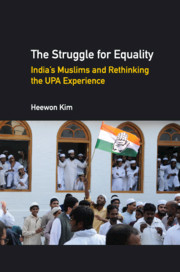Book contents
- Frontmatter
- Dedication
- Contents
- List of Tables and Figures
- List of Abbreviations
- Acknowledgements
- Introduction
- 1 Opening Up the ‘Black Box’ of Public Policy: Towards an Institutional Analysis of India's Policies on Religious Minorities
- 2 Constitution-Making, Equality of Opportunity and Religious Minorities: Reassessing the Critical Juncture
- 3 The UPA in Power: The New Equal Opportunities Framework, Religious Minorities and the Limits of Change
- 4 UPA, Muslims and Public Sector Employment: Assessing the Record
- 5 UPA, Muslims and Service Delivery
- 6 UPA, Muslims and the Communal Violence Bill
- Conclusion
- Appendix Recruitment of minorities in central government departments and public sector undertakings
- Bibliography
- Index
Introduction
Published online by Cambridge University Press: 12 February 2019
- Frontmatter
- Dedication
- Contents
- List of Tables and Figures
- List of Abbreviations
- Acknowledgements
- Introduction
- 1 Opening Up the ‘Black Box’ of Public Policy: Towards an Institutional Analysis of India's Policies on Religious Minorities
- 2 Constitution-Making, Equality of Opportunity and Religious Minorities: Reassessing the Critical Juncture
- 3 The UPA in Power: The New Equal Opportunities Framework, Religious Minorities and the Limits of Change
- 4 UPA, Muslims and Public Sector Employment: Assessing the Record
- 5 UPA, Muslims and Service Delivery
- 6 UPA, Muslims and the Communal Violence Bill
- Conclusion
- Appendix Recruitment of minorities in central government departments and public sector undertakings
- Bibliography
- Index
Summary
One of the most remarkable features of states’ responses to 9/11 was the near uniformity of approach towards Muslim minority communities across the globe. The dramatic impact of the attack on the World Trade Center in New York and the subsequent ‘War on Terror’ were accompanied by policies that appeared to pathologise Muslim minority communities around the discourses of terror, identity politics and self-imposed isolation (Kepel 2004; Roy 2004; and Modood 2005). Increasingly constructed in the language of Huntington's Clash of Civilisations (1996), these policies posited Muslim minorities as ‘the enemy within’. ‘Europe’, admitted the distinguished French scholar Gilles Kepel, has ‘emerged as the primary battlefield’ (2004: 241) between the values of Enlightenment and Islam. Helmut Schmidt, the former chancellor of Germany, opined that ‘a peaceful accommodation between Islam and Christianity is possible only in authoritarian states’ (in Klausen 2005: 3). In many Western states this ‘clash of civilisations within’ was attributed to multiculturalism, a political creed that had allegedly undermined collective citizenship by fostering identity politics. Thus, in the aftermath of the 7 July 2005 (7/7) bombings in central London, British public opinion appeared to agree on the need to reform multiculturalism to remove its apartheid aspects (Wolff 2005).
Polemicists blamed this state of affairs on public policies and practices that encouraged the social and political isolation of minority immigrant communities. The events of Madrid on 11 March 2004 and London on 7 July 2005 gave further impetus to the critics of multiculturalism. However, political and administrative decision-makers, including security experts, were obliged to address the realities of diverse societies to keep jihadis and Islamophobes at bay while recognising the need to confront the segregationist aspects of multiculturalism. This response was matched by political strategies, almost universally across the West, designed to build ‘social cohesion’ and promote integrationist values. While the securitisation of Muslim minority communities reflected the hard edge of this policy, state-led efforts to examine causes of Muslim underachievement and disadvantage mirrored the ‘softer’ integrationist intent (Fekete 2004 and Samad 2013). Almost all states in Europe have adopted policies that include a mixture of these approaches, with the initial emphasis on securitisation being displaced by a renewed policy interest in disadvantage and discrimination suffered by Muslim minorities (Klausen 2005).
- Type
- Chapter
- Information
- The Struggle for EqualityIndia's Muslims and Rethinking the UPA Experience, pp. 1 - 15Publisher: Cambridge University PressPrint publication year: 2019



